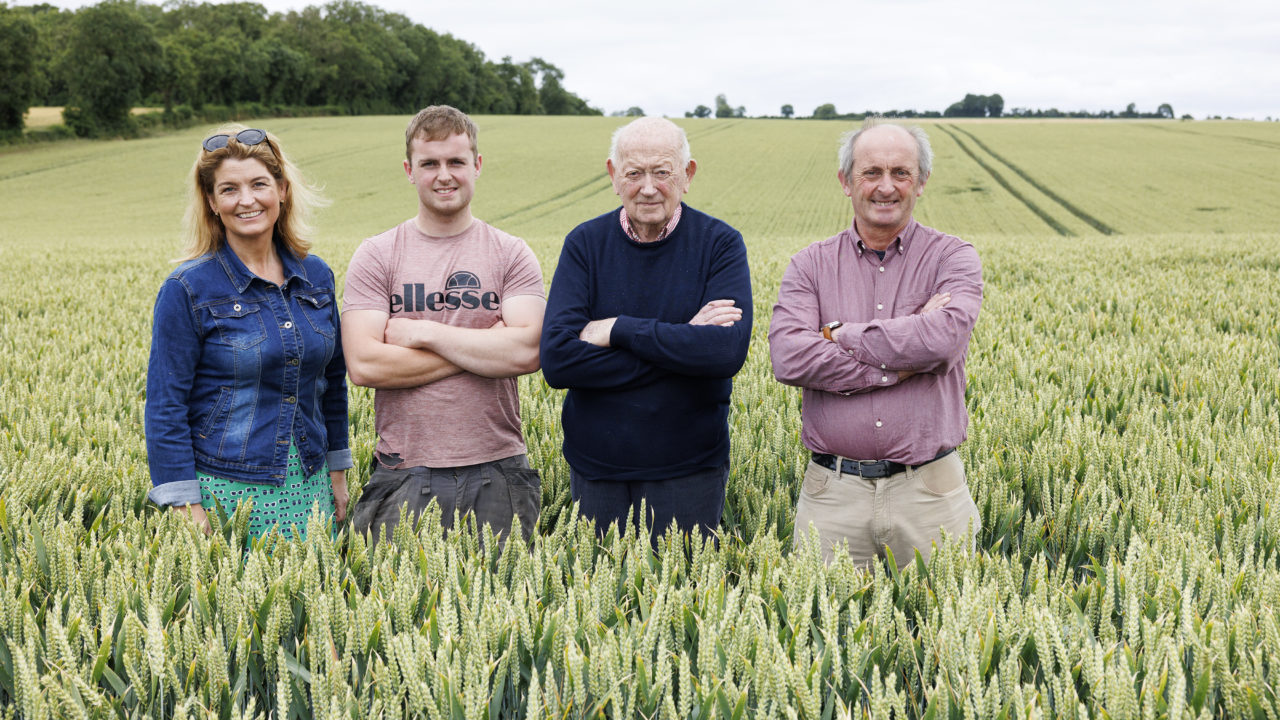“Soil pH is one of the few things that can be easily rectified on farm. The lime we use is locally produced, locally sourced and very affordable given current high input costs,” said tillage farmer Tom Shine.
Tom runs a tillage enterprise alongside his wife, Tracey, his father, John, and his two sons John Jr. and Liam, near Cahir, Co. Tipperary. The Shine family grow a number of crops which are manufactured into coarse rations and sold to local livestock farmers.
When Tom began farming in the early-mid 1980’s, sugar beet was the main output of the farm. The family farm was soil sampled every year at that time.
However, with the demise of the sugar beet industry Tom admits the focus on soil sampling and in turn soil pH was lost.
“We possibly took our eye off the ball a little bit, and only sampled parts of the farm every couple of years,” he said.
Regular application of Grolime ground lime has played a key role in the growth and success of Tom’s tillage farm and feed business.
In the video below, Tom along with local certified Grolime supplier, Peter Gleeson, discuss why lime is so important to increase crop yields and why regular soil sampling has led to significant benefits on farm.
The Shine family grow wheat, barley, oats, rye and oil seed rape, all of which are used in their own mill on the farm except for oil seed rape. Tom manufactures coarse rations which he supplies to local livestock farmers.
“We always dried our grain on farm and are conscious of the carbon footprint of what we are doing, so we decided to move to a biomass system for drying our grain,” stated Tom.
Lime – Return on Investment
Due to high levels of rainfall, Irish soils have a natural requirement for lime to control soil acidity and maintain a favourable soil pH for crop growth, nutrient release and soil quality.
According to Teagasc research, 80 – 85% of our soils are testing sub-optimal for soil pH and major nutrients such as Phosphorous (P) and Potassium (K). Therefore, it has never been more important for Irish farmers to include lime into their soil fertility programme.
Peter explained, the benefit of regular lime application is a multiple of the cost, with research showing that applying €100 worth of lime to tillage soils results in €600-700 of extra production.
“Lime is vitally important to maximising the uptake from applied fertiliser. For cereal farmers it is estimated that there is an extra 1.5t/ha return from the application of lime alone,” he said.
The Shine farm is made up of mostly free draining soil, which is prone to leaching, therefore soil testing regularly is a must. Tom soil samples every year to ensure he is reaching optimum PH of 6.5 for tillage crops.
“Over the course of two seasons we could see a huge improvement in the vigour of crops and their ability to stay standing,” explained Tom.
Not all lime is the same
“We use Grolime because we always know we are going to get a consistent product that spreads easily. It’s nice to know your money is being spent effectively,” said Tom.
Grolime producers are tested twice yearly by independent laboratories. The lime is tested on its Fineness, Moisture Value and the Total Neutralising Value (TNV), which is the neutralising ability of the material.

All lime sold in Ireland must have a TNV greater than 90% to conform to the Department of Agriculture specification. At least 35% of ground limestone (350kg/t) should have a particle size < 0.15mm. This component of the lime is fast acting and very reactive and will start working immediately (0-6 months).
The remaining 65% lime (650kg/t) will be broken down in the soil in the medium term (6-24 months) and helps to maintain soil pH levels in the longer term until the soils are re-sampled in year four.
For more information
Grolime suppliers are acutely aware of the expectations and needs of Irish farmers and are committed to the highest standards of production and quality control.
To find your local Grolime producer, click here.

